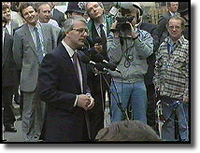
|
The 1992 General ElectionOn 9 April 1992, the Conservatives won their fourth successive genreal election. Their overall majority, however, was only 21, a significant reduction from their 1987 score of 101.
Although the Conservatives were victorious, they suffered significant casualties along the way. The most notable was Chris Patten, the party Chairman, who had his majority of 1,412 turned over by the Liberal Democrats in Bath. He was later appointed Govenor of Hong Kong. In total, nine government ministers lost their seats including the Overseas Aid Minister, Lynda (now Baroness) Chalker who was defeated at Wallasey. The 1992 election was also notable for some prominent figures who retired from the House of Commons. Margaret Thatcher, Denis Healey, Nigel Lawson, Sir Geoffrey Howe, Michael Foot, David Owen and Merlyn Rees all stood down. Betty Boothroyd became the first ever woman speaker in the new parliament, taking the Speaker's Chair on the 27th of April. See also:
1992 - Conservatives |
Diana, Princess of Wales, 1961-1997
Conference 97
Devolution
The Archive
News |
Issues |
Background |
Parties |
Analysis |
TV/Radio/Web
Interactive |
Forum |
Live |
About This Site
News |
Issues |
Background |
Parties |
Analysis |
TV/Radio/Web
Interactive |
Forum |
Live |
About This Site
© BBC 1997 |
politics97@bbc.co.uk |
